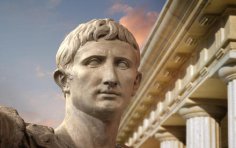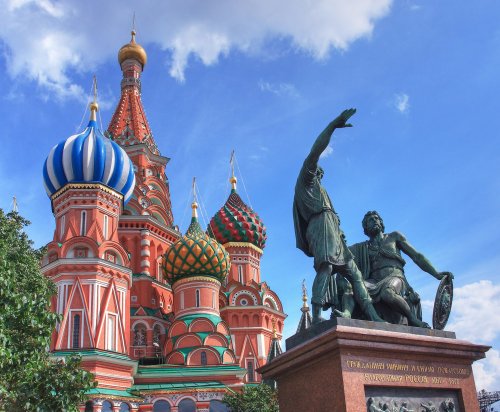
In 56 BC, the Britons really got to Caesar. He was doing something socially useful, conquering Gaul and pacifying the Germans along the way, and then the islanders threw a spanner in the works.
In that year, 56, the Romans conquered Armorica and exterminated the Veneti who inhabited it (some executed, others enslaved). The pretext was the arrest of Roman ambassadors, but most importantly, the Veneti had seized control of the region's trade, possessed a large, modern fleet, and several well-equipped harbors.
The Britons had already helped the Gauls and Veneti as much as they could, and now they sent an expeditionary force to assist their trading partners. This didn't help the Veneti, of course; Rome is Rome. But something had to be done about the Britons.
The following summer, 55, the Romans began actively preparing for an invasion of the Island. They had virtually no information about Britain. The Britons, however, learned of Caesar's preparations immediately. Some tribal leaders promptly sent ambassadors and expressed a burning desire to become clients (or vassals, so to speak) of Greater Rome.
Caesar was delighted and sent an emissary to Britain. A couple of years earlier, the Romans had defeated the Atrebates, and one of their leaders, Commius, had expressed a desire to cooperate, so Caesar appointed him king. Now this Commius had traveled to the island as Caesar's personal representative.
Why was it logical to send an Atrebates to the British leaders? During his two expeditions, Caesar never even encountered real, established Britons. Not long before the events described, the southern part of the Island was captured by the Belgae tribes. They, of course, are also considered Britons, but a slightly different, new formation. The Atrebates of Commius are the same Belgae, only they remained where they belong, in the territory of today's Belgium.
The mission had no effect. Commius was arrested.
In late summer 55, two legions crossed the English Channel. The Britons prevented them from landing near what is now Dover, bombarding the Romans heavily from the white cliffs overlooking the area. Caesar was forced to seek a suitable beach somewhere further west.
The landing operation was difficult. The battle raged right in the water. The Britons prevented the legionaries from landing. Yet Caesar's army achieved its goal. The eagle-bearer of the Ninth Legion distinguished himself during the landing. This legion, although called Hispanic, would figure repeatedly in the history of Roman Britain.
The British leaders sued for peace. They agreed to all terms, including the surrender of hostages. They released the arrested Commius.
Then, the 7th Legion, sent out to search for provisions, was suddenly attacked. The Romans were surrounded by cavalry and chariots and came under intense fire. Somehow, they managed to fight back. The next day, Caesar managed to force the enemy into regular battle, which the Britons lost.
Another peace treaty, declarations of submission, hostages. This ended the first Roman expedition to Britain.
But the next year, 1954, the second one took place.
If not the cause, then a convenient pretext was the arrival of Prince Mandubrac of the Trinovantes at Caesar's headquarters. The chieftain of the Kassi Vellaun (Cassivellaun) tribe attacked the Trinovantes, killed their ruler, and seized their lands. Mandubrac, the ruler's son, managed to escape to the mainland.
Now Caesar took five legions with him. The authorized strength was 30,000 soldiers, but in reality, of course, it was less.
On the second day of the invasion, the Romans were forced to storm a well-fortified fortification in the forest under constant fire. Their training and experience in such matters allowed them to capture the British positions with minimal losses.
This first victory encouraged the Romans, but a storm damaged their ships and they were forced to make repairs.
During this time, Cassivellaunus assembled a large army and quickly formed a coalition that included several tribes. The united army stood in the path of the legions.
The Romans had a difficult time fighting the Britons. They tried to avoid being hit by cohorts drawn up in battle formation, operating in small assault groups, actively firing at the enemy, feigning flight, and leading the Roman cavalry into ambushes. And then there was the unprecedented combat vehicle—chariots. The Britons handled them with great skill, firing from them, then breaking the enemy lines, landing within the formation, and engaging in battle.
Despite all the Britons' valor, the legions won regular battles. After all, it was Rome, Caesar, and military traditions. They forced a retreat, pushed them back beyond the Thames, and then crossed it, despite artificial obstacles like palisades.
Cassivellaunus disbanded most of his army, leaving only the elite forces, four thousand chariots (four thousand – that's Caesar's word, not mine). The Britons on their chariots did everything they could to disrupt the Roman army, destroying foragers, and attacking units that had broken away from the main force.
But the Britons themselves couldn't withstand this war of attrition. Some well-wishers showed Caesar the location of Cassivellaunus' capital and showed him the way. Somewhere in the forest, in the area of the future Verulamium, today's St. Albans.
Cassivellaunus also attempted to organize sabotage in Cantia (Kent), inciting the local leaders to destroy the Roman ships. Nothing tangible came of it, and the British commander-in-chief was forced to negotiate.
The Romans couldn't stay in Britain forever either. They were short of provisions, guerrillas were a nuisance, and there was unrest in Gaul.
The amount of tribute the Britons were required to pay to the Roman Republic was determined. Whether they paid or not, or who paid how, is unclear. In any case, Rome received a sizable income from British trade through customs duties.
A separate clause in the treaty appointed Mandubrak king of the Trinovantes, and Cassivellaunus was forbidden from attacking or harming him in any way. Cassivellaunus ostensibly observed the treaty, but his descendants still destroyed the Trinovantes and seized their lands.
More about the tribe's name—the Catuvellauni. It seems to have been nonexistent during Caesar's time. Subsequently, following a military campaign—albeit a lost one, but one shrouded in glory—the Cassii began calling themselves Catu Vellauni—the heirs of Vellauni. This is the name they would later appear under.





